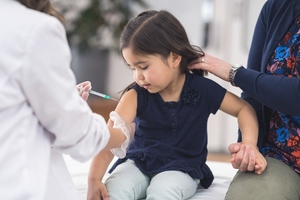Polio vaccine catch-up campaign for London as sewage surveillance findings suggest reduced transmission
Fewer poliovirus detections in London show signs of reduced community transmission but vaccine rates in some London boroughs still too low.

Following the UK Health Security Agency (UKHSA)’s continued surveillance of sewage in London no further vaccine-derived poliovirus type 2 (VDPV2) isolates have been detected since early November, which suggests transmission in London has significantly reduced.
Despite these encouraging findings, the risk from poliovirus remains. The World Health Organization requires evidence of 12 months of zero detections before the UK is no longer considered to be a polio ‘infected’ country.
Vaccination rates in London are lower than the rest of the country with 87.6% of children receiving all their polio vaccinations by the time they turn one year compared to 92.1% in England as a whole. Uptake for the pre-school booster for children aged 5 years is even lower at 69.9% in London compared to 83.4% in England.
In response, the NHS in London will soon be delivering a catch-up campaign, offering polio jabs and other routine childhood vaccines such as measles, mumps and rubella (MMR) to unvaccinated or partially vaccinated children aged 1 to 11 years, during the summer term. Children will receive vaccines through a combination of primary school and community clinics, with a particular focus on supporting communities with the lowest levels of vaccine uptake.
Dr Vanessa Saliba, Consultant Epidemiologist at UKHSA, said:
While there are early signs of reduced spread of the poliovirus in London, we need to continue to improve uptake of childhood vaccines in all communities. Until we reach every last child, we cannot be sure that we will not see a case of paralysis. Even a single case of paralysis from polio would be a tragedy as it is completely preventable.
Only by improving vaccination coverage across all communities can we ensure resilience against future disease threats.
Jane Clegg, Chief Nurse, NHS in London, said:
The risk to children who are unvaccinated or partially vaccinated against polio continues to be a focus for the NHS in London, so they have protection against serious illness.
We urge all parents in London to check their child’s red book or contact their GP practice to get up to date with their polio vaccination schedule. To make this easier for families, from the summer term, polio vaccination will be offered through primary school and community clinics for 1 to 11 year olds.
Between February and May last year several closely related polio viruses were found in sewage samples at the London Beckton Sewage Treatment Works following routine surveillance undertaken by UKHSA and the Medicines and Healthcare products Regulatory Agency (MHRA). Further sampling found that the virus had continued to spread in the community and evolved into a VDPV2.
In August 2022, the World Health Organization confirmed that the UK had a ‘circulating’ VDPV2. VDPV2 acts more like ‘wild’ polio and on rare occasions can cause serious illness, such as paralysis, in people who are not fully vaccinated.
The NHS in London responded with an emergency immunisation programme, contacting parents of children not up to date with their polio vaccinations and offering an additional dose of polio vaccine to those fully vaccinated.
No paralytic polio cases have been reported in patients in England. However, there is still a risk that the VDPV2 could cause paralysis in an unvaccinated individual, as seen in the US last year and more recently in Israel.
A total of 135 poliovirus type 2 isolates have been identified in 30 sewage samples collected in London between 8 February and 8 November last year. While the sewage surveillance was expanded to cover the whole of London, to date the virus has mainly been detected in samples from North and East London.
In September sewage surveillance was rolled out to 18 areas* outside the capital. This was on a precautionary basis to determine whether the virus had spread further. To date, the poliovirus found in London has not been detected at any of these sites.
UKHSA will continue to work with the NHS in London to ensure the next phase of the response helps maintain protection against polio, measles and other infections – in both the population overall in London and in communities at greatest risk.
*The additional sites where the sampling has been rolled out are Sewage Treatment Works covering parts of Birmingham, Blackburn with Darwen, Bradford, Brighton and Hove, City of Bristol, Bury, Castle Point, Leeds, Leicester, Liverpool, Luton, Manchester, North Tyneside, Newcastle upon Tyne, Gateshead, Nottingham, Preston, Salford, Sheffield and Watford. London sites will continue to be tested bi-weekly, and the rest of the country is on a monthly sample collection and testing cycle. More information is available on the expansion of polio sewage surveillance to areas outside London.
About polio vaccines
The best way to prevent polio is to make sure you and your child are up to date with your vaccinations. The vaccine is given as part of a combined jab to babies, toddlers and teenagers as part of the NHS routine childhood vaccination schedule.
It’s given when your child is:
-
8, 12 and 16 weeks old as part of the 6-in-1 vaccine
-
3 years and 4 months old as part of the 4-in-1 (DTaP/IPV) pre-school booster
-
14 years old as part of the 3-in-1 (Td/IPV) teenage booster
You need to have all of these vaccinations to be fully vaccinated against polio.
If you are not up to date, you can have a polio vaccination at any point for free on the NHS.
You should also get vaccinated even if you’ve had polio before as the vaccine protects against 3 different types of poliovirus.
UK Health Security Agency press office
10 South Colonnade
London
E14 4PU